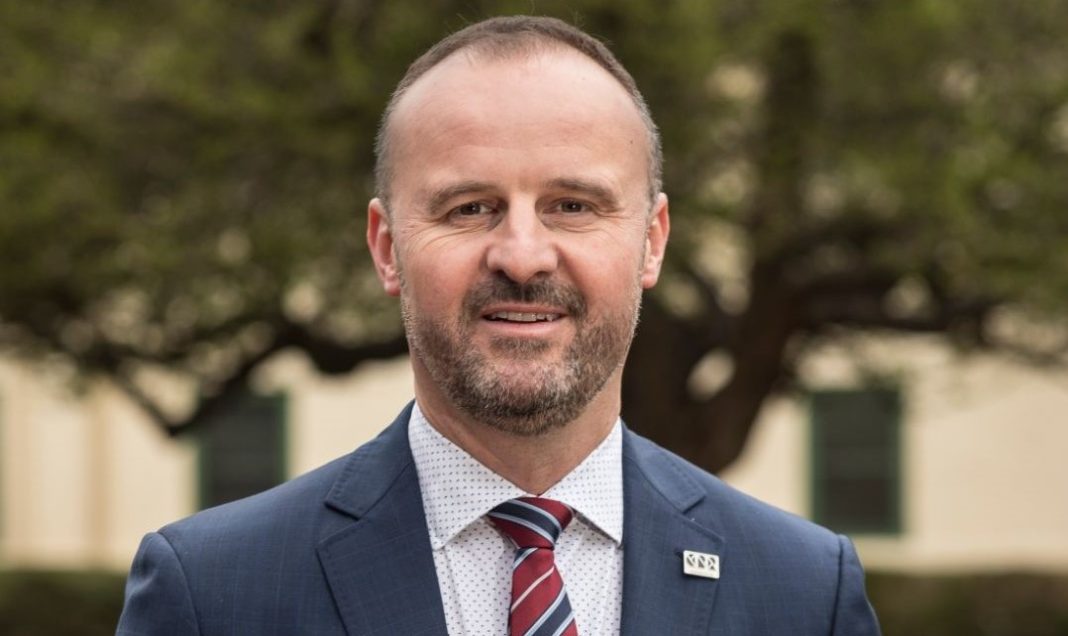The ACT Government’s priorities for the final parliamentary year in the 10th Legislative Assembly are to complete “the progressive platform the Canberra community voted for in 2020”; deliver new and renewed infrastructure; and help Canberrans cope with the cost of living, Chief Minister Andrew Barr said today.
“Throughout this term of Government, we have delivered key commitments in areas including affordable housing, the transition to a low emissions future, equitable access to early childhood education, and reforms to the criminal justice system,” Mr Barr said.
“For the remainder of this term the Government will be focused on completing our ambitious agenda, building Canberra’s future, and helping Canberrans cope with the cost of living.
“We’re willing to make the right calls and invest in Canberra now, so that we can all benefit over the coming years.”
Last year, Mr Barr said, the government met more than 60 commitments from the Parliamentary and Governing Agreement, including passing Planning reforms to build more affordable housing in established suburbs; establishing free three-year-old preschool one day a week for all families; switching on Canberra’s first grid-scale battery; raising the Minimum Age of Criminal Responsibility; designing a major new hospital for the Northside (following the compulsory acquisition of Calvary Public Hospital); and personal possession drug decriminalisation reforms.
Housing and infrastructure
Canberra’s population has grown from 380,000 in 2013 to more than 465,000 in 2023, so more housing is needed, Mr Barr acknowledged. His focus is on “a carefully considered mix of expansion in the right areas, and infill done in the right way, to give residents options on how they want to live”.
He said the government was involved in national efforts for secure and affordable housing. At the local level, planning reforms (including the new Territory Plan and District Strategies), urban renewal, suburban land release, build to rent incentives, and stamp duty supported the construction of more homes. A forthcoming Bill will implement the Better Deal for Renters reforms agreed by National Cabinet.
The government plans to continue “once-in-a-generation” infrastructure projects (Woden CIT Campus, the city theatre precinct, light rail to Commonwealth Park and on to Barton and Woden, the convention centre precinct, and the health, education and sports stadium precinct in Bruce).
Active transport infrastructure (the Garden City cycle route, the Bowen Drive to Kingston Foreshore upgrade, improvements to the Lake Ginninderra pathway and the Sulwood Drive cycleway at the base of Mount Taylor) and upgrades to the Monaro Highway and the Molonglo River Bridge crossing will also be upgraded, while the refurbishment of the Fitzroy Pavilion at Exhibition Park will open later in the year.
Cost of living
Mr Barr acknowledged that cost-of-living pressures were affecting some Canberra households, and promised the government would help.
“We can’t solve everything – mortgage costs and grocery prices are largely outside ACT jurisdictional control – but in areas we can influence, such as health costs, energy bills, and educational expenses – the Government will continue to ease the pressure,” Mr Barr said.
Cost of living and concessions support in 2023-24 is estimated at $145.2 million.
Last year, the government provided utilities concessions, energy bill relief, payments to households waiting for priority housing, and taxi subsidies. Ongoing cost saving measures for essential services include free Nurse-led Walk-in Centres; the Education Equity Fund; free preschool for three-year-olds; free Chromebooks for students; rent relief; and real-time information on fuel prices.
The ACT government will also work with the federal government, which is delivering tax cuts and consumer price relief, Mr Barr said.
Health
In healthcare, the government will open the Critical Services Building, part of the Canberra Hospital Expansion, in the middle of the year; expand nurse-led walk-in centres; hire more nurses, doctors, and allied health professionals; improve mental health services, with new facilities at Canberra Hospital and North Canberra Hospital; and establish an Aboriginal and Torres Strait Islander community-controlled residential drug and alcohol rehabilitation service.
Drug decriminalisation and pill testing schemes had worked, Mr Barr argued: of the 70 people found with personal possession drugs, the majority chose diversion.
The Assisted Dying Bill, introduced last year, will be debated in the first half of this year. Pending the passage of the bill, the public service will set up systems and safeguards to implement the legislation, to ensure “voluntary assisted dying becomes a legal option for eligible Canberrans as quickly as possible”.
Economic performance
Over the past decade, Mr Barr noted, the Territory economy grew by nearly 41 per cent, surpassing national growth at 27 per cent. In 2022-23, Gross State Product grew by 4.3 per cent. Mr Barr said the ACT enjoys “effective full employment, record tourism numbers, and strong tertiary and trades graduate recruitment”.
Mr Barr said the ACT saw national leading business growth in recent years. Between 2019 and 2023, the number of businesses in the ACT grew by 21.2 per cent, the highest percentage growth of all jurisdictions and higher than the national average of 14.1 per cent. The ACT’s annual business growth rate was the highest of any state or territory for 2020- 21 and 2022-23.



